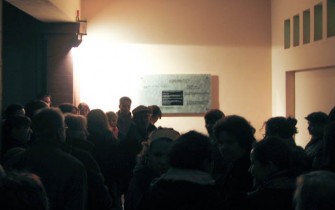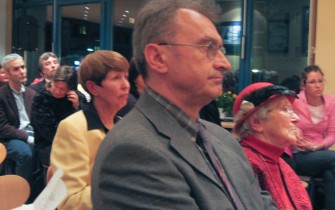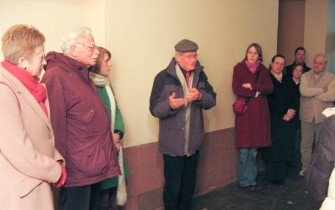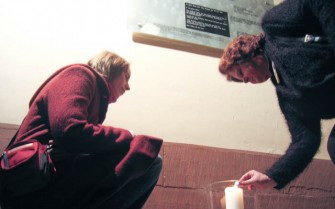Julius-Flörsheim
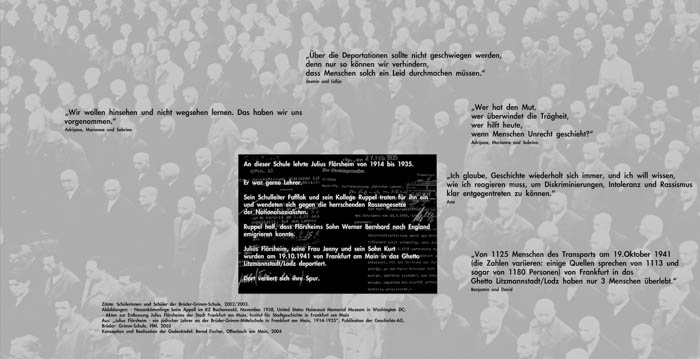 Julius Flörsheim Commemorative plaque at Brüder-Grimm-Schule
Julius Flörsheim Commemorative plaque at Brüder-Grimm-Schule
Frankfurt am Main
2005
Assignment
A plaque serving as a memorial to a former teacher and two of his colleagues was to be mounted in the school.
Concept
Bernd Fischer’s concept was to design a commemorative plaque which would endure thanks to the information documented by the school itself. “Julius Flörsheim, a Jewish teacher at the Brüder Grimm Secondary School in Frankfurt/Main” a research project undertaken at the school and published in 2003 formed the basic material source on which Fischer’s artistic solution was based. Quotes by pupils who succinctly expressed their motivation for the project, their feelings or the knowledge they gained was just as important to Bernd Fischer as the information on the historical event.
Unveiling the Memorial Plaque on 10. March 2005
Artistic/functional solution
Bernd Fischer decided to use a screen-printing technique on two joined panes of glass.
– On the upper glass surface are quotes from pupils. Through this upper glass panel another is visible below, recognizable through the difference in surface material and how the two levels are placed together (this can be seen when walking past the plaque).
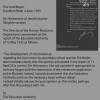
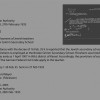
File Flörsheim
On the lower glass plate is a photograph showing prisoners at the Buchenwald concentration camp, school authority documents (Flörsheim records) and a biographical note on a former teacher and two of his colleagues. This information which has been brought to light by the school project now lies like a deeper archaeological layer made visible beneath the words of the pupils in 2003. The images and text were rendered with extremely resistant colors in the chosen printing process. Bernd Fischer’s interest in glass as a material was due not only to its transparency but also to the objective, neutral effect it produces.
Text
Julius Flörsheim taught at this school from 1914 to 1935.
He enjoyed his work as a teacher.
The headmaster Fafflock and his colleague Ruppel spoke up for him and
opposed the prevailing Nazi racial laws.
Ruppel interceded on behalf of Flörsheim’s son Werner Bernhard, enabling the latter to emigrate to England.
On 19 Octoober 1941 Julius Flörsheim, his wife Jenny and his son Kurt were deported from Frankfurt/ Main to Litzmannstadt ghetto in Lodz.
All trace of them vanished there.
“People should not remain silent about the deportations, because only if we speak out can we prevent people having to undergo such suffering.”
Jasmin and Lidija
“We want to learn to take notice and not ignore things. That is what we have decided.”
Adriajana, Marianna and Sabrina.
“Who has the courage, who overcomes lethargy, who helps today when people suffer injustice?”
Adriajana, Marianna and Sabrina.
“I believe history always repeats itself, and I want to know how I have to act in order to counter discrimination, intolerance and racism.”
“Of the 1,125 persons transported on 19 October, 1941 (number varies, some sources talk of 1,113, some even of 1,180) from Frankfurt to Litzmannstadt ghetto in Lodz, only three survived.”
Quotes
Pupils of the Brüder Grimm School 2002-3
Illustrations: New arrivals at roll call in Buchenwald Concentration Camp November 1938. United States Holocaust Museum, Washington D.C.
Records from the City of Frankfurt, on the dismissal of Julius Flörsheim, in the Institut für Stadtgeschichte, Frankfurt/Main.
From: “Julius Flörsheim – ein Jüdischer Lehrer an der Brüder-Grimm-Mittelschule, Frankfurt am Main, 1914-1935”. Publication by the Geschichts-AG, Brüder-Grimm School, FFM, 2003
Concept and realization of the plaque Bernd Fischer, Offenbach/Main, 2004
Technical details
Two glass panels measuring 76 x 120 cm are joined into one. These are printed with ceramic colors in black (upper and lower panels) and white (lower panel). Ceramic colors are extremely durable, light-fast and weather resistant. The glass is processed into safety glass with a final thickness of 10 mm. This thickness of glass is resistant to fairly strong football kicks. The laminated panel is mounted outside approximately two cm from the wall with four spacers.
